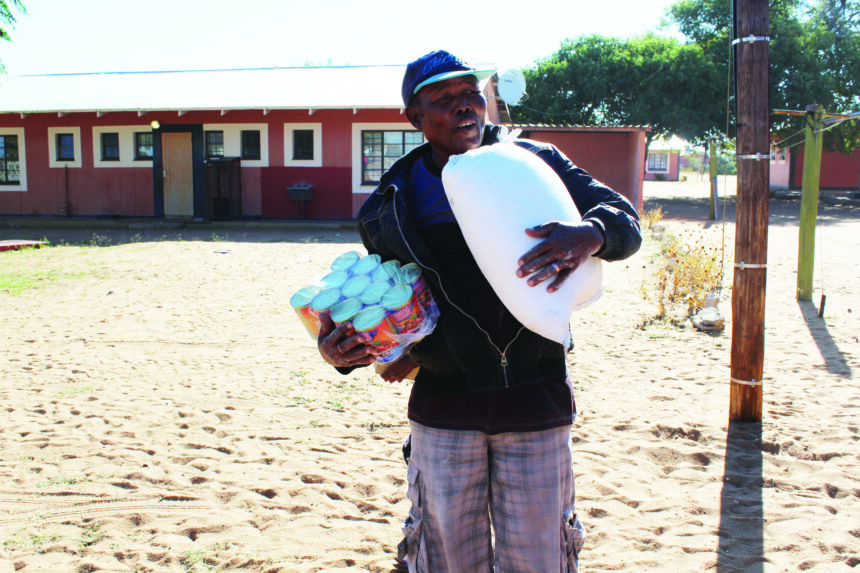MARIENTAL – With the drought having a tight grip on most parts of the country, farmers in the Hardap region have been accused of failing to distribute drought relief food intended for their workers.
This troubling state of affairs has exacerbated food insecurity and economic hardship among the already-suffering farmworkers, worsening the devastating effects of the prolonged drought, which has not only threatened livelihoods, but life itself too.
Recent reports show that farm owners have collected food consignments meant for drought relief, but many do not deliver these vital supplies to the workers who depend on them. This has raised serious concerns about the integrity and responsibility of those in charge of distributing the much-needed aid.
Axab Skrywer, deputy director for administration at the Hardap Regional Council, acknowledged that several complaints have been received from various affected locals.
“We have been informed about these issues, and we set up a monitoring team to assess the situation on the ground. Unfortunately, we could not see that happening again,” he said.
The government’s drought relief programme is designed to alleviate some of the hardships which households face. However, its effectiveness is being undermined by a myriad of issues at local distribution level.
“We must ensure that the aid reaches those who need it the most”, Skrywer noted.
As conditions worsen and food insecurity rises, regional stakeholders have called for immediate action to ensure relief efforts fulfil their intended purpose.
This was part of a recent disaster risk management report, which highlighted several challenges contributing to the ongoing crisis. Among these are transport difficulties due to vast distances and challenging terrains, a lack of adequate storage facilities at constituency development centres, and suppliers failing to deliver monthly food allocations on time.
The report thus emphasised the urgent need for improved logistics.
Additionally, it pointed out the increasing incidences of veld fires, which pose safety risks. There are also operational hurdles such as vacant positions for warehouse staff, and a critical need for urgent renovations of storage facilities.
“The lack of equipment like a forklift further complicates loading and unloading operations, making it difficult to manage supplies effectively,” reads another section of the report.
Recommendations
In response to these pressing issues, several recommendations were made.
These include enhancing regional coordination with government agencies for transportation solutions, and establishing storage facilities in collaboration with line ministries.
The report urged suppliers to strictly adhere to delivery schedules, and recommended procuring vehicle-mounted firefighters and safety gear to address fire risks.
Moreover, it called for the launch and operationalisation of a community-based management information system in the region to better track and manage resources.
The Office of the Prime Minister (OPM) has been urged to expedite the recruitment processes for essential positions, and prioritise renovations of warehouses that are compromising safety and storage capabilities.
“The procurement of a forklift is critical for improving our logistics’ operations,” the report added, underscoring the fact that without addressing these foundational issues, effective relief efforts will remain severely hampered.
In May this year, President Nangolo Mbumba declared a state of emergency because of the protracted drought.
Although the government has since late last year continued rolling out drought aid to farmers and households countrywide, limited funds and competing priorities have somewhat hindered efforts to reach all affected households.
Prime Minister Saara Kuugongelwa-Amadhila revealed during the 9th Session of the Africa Regional Platform for Disaster Risk Reduction Conference in Windhoek last mont, that Namibia is grappling with a funding shortfall of N$482 million to shield 1.26 million drought-stricken citizens from a looming hunger crisis.
She said of the planned N$1.6 billion drought relief programme, the government currently faces a funding gap of about N$482 million to reach an additional 373 276 households, which translates into 1.26 million people, or 41% of the country’s population.
During his mid-term budget review last week, finance minister Iipumbu Shiimi said the OPM continues to roll out the drought relief programme to affected regions and communities at a cost of N$129.8 million per month.
“We have made available an additional N$698.8 million for drought relief provisions under the OPM, primarily to extend the food distribution programme to eligible communities. This allocation provides for the drought relief programme to be expanded to cover 308 750 households until 30 June 2025,” said the minister.
This allocation increases the total drought relief budget for FY2024/25 to more than N$1.4 billion. -mndjavera@nepc.com.na



